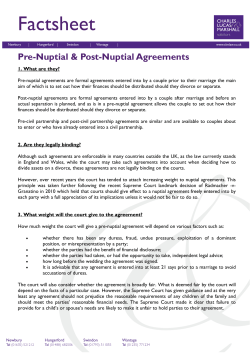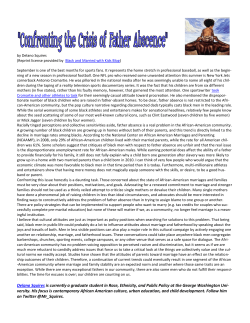
1 HOW TO AVOID ADULTERY Sermon preached by Pastor C. John Steer
1 HOW TO AVOID ADULTERY Sermon preached by Pastor C. John Steer Autumn Ridge Church, Rochester, MN JULY 27-28, 2013 No. 5: Scripture: Kingdom Living Matthew 5:27-32 People sometimes tell me that they don’t read the Bible because it is not relevant to daily life. I can only assume they are not familiar with the Sermon on the Mount. For it is as up-to-date as tomorrow’s headlines. That is why we are studying it this summer. Last week we saw how Jesus addressed the very practical subject of anger. Today Jesus talks about HOW TO AVOID ADULTERY. It is hard to think of anything more helpful to family happiness as a recent survey by the National Opinion Research Center revealed. 15 percent of married women acknowledge having had an affair. 21 percent of married men make the same claim. And that is just those admitting adultery. The numbers are probably far higher. Behind those dry statistics are a flood of painful emotions. There is betrayal, disappointment and hurt. For adultery results in miserable marriages and fragmented families. So this should not be a message we sleep through but rather one where we hang on to every word that Jesus has to say. To appreciate the importance of what Jesus is teaching about adultery we need to step back and consider the wider perspective of scripture on the subject of marriage. For Jesus’ concern here is not primarily with adultery but with wanting us to have a great marriage. So we start by marvelling at THE MAJESTY OF MARRIAGE. Marriage is one of God’s greatest gifts. This is brought out wonderfully in the creation story. God first makes every part of his world and declares it good. But then God made the first family and he said it is great. It is the peak of his perfection. That is why God wants to bless our marriage and make our homes happy. He wants us to experience the total delight and joy that Adam and Eve originally had in each other. A young couple will be married at Autumn Ridge this afternoon. They will arrive single and leave married. 2 What brings about the change? It is not love for they already love each other. Rather it is the vows they will publically make to God and each other during their wedding. They will make a lifelong commitment to be faithful to each other irrespective of their feelings or circumstances. Biblical marriage is all about commitment. That is why trial marriages are a bad idea. A couple who are living together are saying, “I am not committed to you. I am not sure this is going to work. So I am going to keep my options open to bail out. “ Relationships can’t thrive in that uncertainty. Children can’t grow up without security. Families today are in trouble because we have the wrong idea of love and marriage. Love has become a mixture of physical desire and vague sentimentality. Marriage has become a provisional sexual union to be terminated when our feelings dissolve. But God’s intentions for marriage are much higher. He shows that marriage and love are for the tough minded. Marriage is a covenant commitment and far from backing out when the going gets rough, marriage partners are to sort out their difficulties in the light of scripture. They are to press on, improving their relationship, working away at it, precisely because they vowed before God to love each for better for worse, for richer or poorer, in sickness and in health, until death separates them. It is out of God’s desire to give us a marvelous marriage that gets stronger and better over the years that Jesus gives this us teaching on adultery. The second big principle we must grasp in coming to this passage is THE SPIRITUALITY OF SEX. When two people get married something extraordinary happens. Two becomes one. They become one flesh and one person. That means each of them is now a half. We husbands like to refer to our wives as our better half. But that arrangement is destroyed by adultery because adultery adds a foreign body to the marriage. Adultery messes up the math. There are no longer two halves but three and that breaks the union of marriage. Now where does this spirituality of sex come from. We find the explanation in Genesis where God declares, “Let us make mankind in our image, in our likeness . . . so God created mankind in his own image, in the image of God he created them, male and female he created them.” (Genesis 1:26-27) 3 God is Spirit and yet mysteriously male and female are made in his likeness. In other words our sexuality illustrates spiritual truth. That is why in the middle of the Bible there is an erotic love song. It is called “The Song of Solomon”. It is there because it describes something spiritual. Christians down through the years have found in that sexy poem helpful ways to describe their relationship with God. Paul does the same thing in Ephesians chapter 5 when he tells us that marriage is a picture of the relationship between Christ and his bride the church. So sex is not merely a physical appetite. It includes the whole person body, mind and spirit. When we make love with another person we are giving ourselves psychologically and emotionally to them. We will never be the same again. That is why sex needs to be reserved for the marriage bed. It is not to be casual but a statement of our commitment. When we treat sex as only physical we rob it of its true value and sooner or later we will spoil it. The tragedy is that our culture is spoiling the joy and beauty of physical intimacy. Movies and TV shows depict adultery in an exciting and positive light. Social commentators justify adultery if there is love. But Jesus wants to rescue our sexuality and restore it to its rightful place in a passionate marriage where it is cherished and safe and is a practical expression of our wedding vows. It is against this background of the majesty of marriage and the spirituality of sex that Jesus’ next words in the Sermon on the Mount make sense. For now he goes on to talk about THE PAIN OF PROTECTION. Now you don’t bother to protect something unless it’s immensely valuable. Marriage meets that criteria and that is why it is worth protecting even at considerable cost. So Jesus says, “You have heard that it was said, ‘You shall not commit adultery. But I tell you that anyone who looks at a woman lustfully has already committed adultery with her in his heart.” (v27-28) Jesus is referring to the seventh commandment, “You shall not commit adultery.” We saw last week that each of Jesus’ six illustrations of Kingdom Living are introduced with this phrase, “You have heard that it was said.” Jesus is referring to the faulty interpretation of the commandment given by the Pharisees and the teachers of the law. They understood “You shall not commit adultery” in the narrow sense of the physical act of unfaithfulness. But Jesus wants us to go deeper. 4 He longs to protect our marriage, so he desires that we understand the root cause of adultery. In the previous section of his sermon Jesus did the same with murder showing us that anger is the emotion that leads to murder. Here he shows that lust is the emotion that leads to adultery. So if we are going to protect the marvelous marriage that God has given us we need to be on the lookout for lust. This expands “do not commit adultery” to all of us. Lust is not just the prerogative of married people. It applies to single people too. What is lust? Lust is when we use our God given imagination to create a movie in our mind involving sexual fantasy. This makes lust particularly dangerous. For lust is easy to do and initially it is invisible to others. There are respectable people who would never dream of committing adultery but who enjoy sinning in their imagination. Let us understand that Jesus is not forbidding men to look at women. That is one of the great joys of life. Men are simply forbidden to look lustfully and the same applies to women looking at men. We all know the difference between looking and lusting. Now in graphic terms Jesus tells us what we need to do to protect our marriage and prevent lust from leading to adultery. He says “If your right eye causes you to stumble, gouge it out and throw it away. It is better for you to lose one part of your body than for your whole body to be thrown into hell. And if your right hand causes you to stumble, cut it off and throw it away. It is better for you to lose one part of your body than for your whole body to go into hell.” (v29-30) Some Christians, whose zeal greatly exceeded their wisdom, have taken Jesus literally. The best known example is the third century scholar Origen of Alexandria. He looks miserable because he went to extremes of asceticism, renouncing possessions, food and even sleep and in an overly literal interpretation of this passage he actually made himself a eunuch. Soon afterwards in AD 325 the Council of Nicea, which gave us the Nicean Creed, outlawed this barbarous practice. What Jesus is advocating is not a literal physical self-maiming but a ruthless moral self-denial. 5 He is saying if your eye causes you to sin because temptation comes to you through your eyes then pluck out your eyes. That is don’t look. Behave as if you had actually removed your eyes and flung them away. If your hand or foot causes you to sin because temptation comes to you through your hand or your feet then cut them off. That is don’t do it. Don’t go there. Behave as if you had actually cut off your hands and feet. Jesus is showing us that to have victory over lust and to avoid adultery we have to cut out certain things from our life. Certainly this means all pornography. But there may be books we can’t read or films we can’t see or websites we can’t visit because they are going to cause our mind to go down a certain path which left unchecked can result in adultery. Others may laugh at us and call us old fashioned. That does not matter. That is the cost of being pure and protecting our marriage. There are things we cannot look at with our eyes, places we cannot go with our feet and activities we cannot do with our hands because we want to preserve this marvelous gift of marriage that God has given us. Jesus is telling us that we must deal drastically with sin. We mustn’t pamper it, flirt with it, enjoy nibbling a little of it around the edges. Rather are to hate it, crush it and dig it out. This is what the old theologians called “the mortification of the flesh.” Paul explains it this way, “Put to death, whatever belongs to your earthly nature, sexual immorality, impurity, lust, evil desire . . . which is idolatry.” (Colossians 3:5) Teens and students, this is particularly relevant to you. For you live in a sex-saturated society which makes it immensely easy to lust and immensely hard to be pure. One day you will be married and God wants that to be a great sexual adventure. But it won’t be if you bring to your honeymoon many different sexual experiences with multiple partners. So learn to put to death sexual immorality. When you get married you will be so glad you did. Because our body, mind and soul are all connected there are spiritual ramifications to lust and adultery. Twice in this passage Jesus talks about our body being thrown, “into hell”. This is a reminder that the most important thing we have to do in this world is to prepare ourselves for eternity. This isn’t to diminish the importance of life in this world. After all this is God’s world and we are to live a full life here. 6 What Jesus is saying is that it is better to be maimed in this world so that we can one day stand in the presence of God with great joy. This concern for our soul might mean we don’t get a promotion in our work. We don’t do as well as somebody else. But what should it profit a man if he gains the whole world and loses his soul. So we are to do everything we can to protect our soul and mind and body. It may involve pain and struggle but it is worth it for the rewards are tremendous. Those rewards include a happy home with a God glorifying marriage and children being brought up in the nurture and admonition of the Lord. That is why a good marriage begins with surrendering our lives to Christ. The same is true if we are single and we want to win the battle with lust and keep ourselves pure. We ask God to renew our mind with his spirit. Finally Jesus presents us with the DISCOURAGEMENT TO DIVORCE. He declares, “It has been said, ‘Anyone who divorces his wife must give her a certificate of divorce. But I tell you that anyone who divorces his wife, except for sexual immorality, makes her the victim of adultery’.” (v31-32) The Jews of Jesus’ day had it heard it said that if a man wanted to divorce his wife he must give her a certificate of divorce. Actually they were hearing something not quite true. The relevant Old Testament passage was Deuteronomy 24 which begins “If a man marries a woman who becomes displeasing to him because he finds something indecent about her and he writes her a certificate of divorce . . . then her first husband who divorced her is not allowed to marry again.” (Deuteronomy 24:1-4) The main thrust of this Deuteronomy passage is that if a husband found something indecent in his wife and divorced her giving her a certificate of divorce he can’t later remarry her. However, by Jesus’ day this main principle was overlooked in favor of concentrating on what “Something indecent about her” really meant. The historian Josephus tells us that in the first century there was a great debate between two Rabbis called Hillel and Shammai. Rabbi Shammai took a strong line and taught from Deuteronomy 24 that the only ground for divorce was some great matrimonial offense. Rabbi Hillel had a very lax view of Deuteronomy 24. He said a man could divorce his wife for any reason whatsoever, like burning the dinner. Later in Matthew’s gospel these two groups come to Jesus with this question, “Is it lawful for a man to divorce his wife for any and every reason?” (Matthew 19:3) 7 In reply Jesus said, “Haven’t you read,” “that at the beginning the Creator made them male and female; and said, ‘For this reason a man will leave his father and his mother and be united to his wife, and the two will become one flesh. So they are no longer two, but one flesh. Therefore what God has joined together, let no one separate. “Why then,” they asked, “did Moses command that a man give his wife a certificate of divorce and send her away?” Jesus replied, “Moses permitted you to divorce your wives because your hearts were hard. But it was not this way from the beginning. I tell you that anyone who divorces his wife, except for sexual immorality, and marries another woman commits adultery.” (Matthew 19:4-9) Jesus here is giving us a biblical history of divorce. When God created marriage, divorce was inconceivable so no allowance was made for it. But then selfishness entered the world and men started divorcing their wife for trivial reasons and women were being thrown out of their house without any protection. They did not want a divorce. It was forced on them. Some of you have experienced that painful reality. You were willing to work on your marriage but your spouse walked away. Perhaps you wondered if God cared. Well he does. That is why God gave Moses gave a new command to limit the damage of divorce. Now men had to give their wife a certificate of divorce to explain why she was free. Moses did this because their hearts were hard towards God. But Jesus explains that even this permission to divorce was limited to sexual immorality. The word he uses for sexual immorality is porneia. It is where we get our word “pornography.” It refers to adultery, fornication and unnatural vice. So Jesus is explaining you can’t divorce your spouse because you are bored or you have met someone else or you have outgrown them. The only possible reason for divorce is adultery. That is because adultery destroys the trust of marriage and sometimes it is impossible to recover that trust. However this permission to divorce because of adultery is not a command to do so. Indeed we see here that Jesus is discouraging us thinking about divorce at all. Rather he encourages forgiveness and the desire to try again helped by the Spirit of God and the grace of Christ. 8 Many Christians have found that God has honored their desire to rebuild their marriage, even after unfaithfulness, and they have gone on to have an exceptional marriage. We have two examples of this forgiving spirit in scripture. The first is where the Prophet Hosea marries a woman called Gomer. She is promiscuous and sleeps with every man she meets but Hosea takes her back again and again. And God commends him for it. The second example is God himself who repeatedly forgives the spiritual adultery of his people. He does not cast us off. He restores us and takes us back. When a man is able to do that with his wife or a woman with her husband they are acting in a God-like way. Now let’s be honest this is immensely difficult and sometimes it is impossible. It takes a couple who are equally committed to making this work and that is not always the case. And that is why Jesus does permit divorce in the case of adultery. But for couples brave enough to try their can be great rewards. I have witnessed it many times. With a lot of work and usually professional help, marriage has been saved, it has recovered and sometimes it is stronger than before. These words from Jesus convict us. They find us out. For with Jesus’ wider definition we have all committed adultery. For some of us it has been physical adultery. For others of us it has been mental adultery. It is sobering to think that in the Bible the penalty for adultery was death by stoning. But Jesus died on the cross to pay the penalty for our adultery. So we must go to the cross. We must confess our sin. We can take great comfort that in the Old Testament God forgave David for his adultery. In the New Testament Jesus rescued a woman caught in the very act of adultery who was about to be stoned. He said to her, “Neither do I condemn you, go now and leave your life of sin.” (John 8:11) This is not all the Bible has to say about divorce. For those interested I have attached our church’s statement on divorce at the end of this manuscript. But this is all that Jesus has to say here. His message is, “Fight for your marriage. It’s precious and worth protecting and preserving.” 9 Let me close with some practical suggestions for how we can do that. First, express your love When eight of us from Autumn Ridge were walking the Cleveland trail in England earlier this month we came to the village of Osmotherley. Back in the 18th century John Wesley stopped at that village. In the village square there is a stone table. Wesley stood on that table and preached a sermon. I was encouraged to reenact the scene. So I jumped on this stone table and read Wesley’s sermon. It talked about the importance of telling people that we love them. That act builds up relationships and tears downs lust. Second join a small group. You can join as a couple or separately. I am in a group with other men. It keeps me honest. We study together and pray together. Next month many of our small groups start up again. If you are not part of one, do join. There is a box on your Welcome Card where you can indicate your interest or you call the church office. Third, use a marriage mentor. We have some couples in our church who have strong marriages. They would love to share their secret with you. Perhaps you are going through a difficult time in your marriage and you would benefit from meeting with another couple who can pray with you and give you some godly counsel. If you would like to take advantage of this do call the church office. Fourth, depend on the Spirit. It would be completely wrong to draw the conclusion that Jesus is telling us to just be better people. He is not. Willpower on its own will never be enough to avoid lust and adultery. We need the Holy Spirit’s power. The good news is we are not on our own in this struggle. Paul writes, “Live by the Spirit and you will not gratify the desires of the sinful nature.” (Galatians 5:16) 10 Autumn Ridge Church Position on Divorce and Remarriage November 18, 2004 God’s plan for marriage Marriage was the first human institution that God ordained. Jesus, when speaking to the Pharisees said, “Haven’t you read that at the beginning the Creator ‘made them male and female,’ and said, ‘For this reason a man will leave his father and mother and be united to his wife, and the two will become one flesh’? So they are no longer two, but one. Therefore what God has joined together, let man not separate” (Matthew 19:4). When a man and a woman are joined in marriage they become one physically and spiritually. We therefore uphold the sanctity of marriage in a lost and fallen world. Divorce, the result of “hardened hearts” Becoming a Christian does not erase the earthly consequences of sin. Although we are becoming more like Christ, we may still suffer from emotional pain, personality defects, and sinful habits that are linked to our fallen nature. As a result, our marriages can be stressed and badly wounded, even to the point of being destroyed. Divorce was not part of God's original plan (Matt. 19:8). Although the Law of Moses permitted a man to divorce his wife when she was found "displeasing to him because he finds something indecent about her" (Deut. 24:1), Jesus taught that divorce was allowed only because our "hearts were hard". God knows we are sinful and that is the only reason He allowed divorce. . The prophet Malachi tells us that God hates divorce (Malachi 2:16). Therefore, as Christians, we should have the same attitude toward divorce as God does and as a church we must strive to strengthen marriages. The Bible allows Christians to divorce only under certain circumstances Believers are to strive for unity in their marriage even when there are differences of opinions and desires. Divorce rarely solves a problem and is always destructive to families and relationships. There are certain conditions under which Christians are allowed to divorce. One is when a spouse is guilty of porneia. Porneia refers to a variety of sexual activity including adultery, homosexuality, beastiality and incest (Matthew 5:32, 19:9, I Corinthians 5:1). The Apostle Paul taught that when a non-believer refuses to live with their believing spouse, particularly because of his or her Christian faith, divorce is allowable) but a believer should not initiate a divorce from an unbelieving spouse who is willing to continue their marriage relationship (I Corinthians 7:12-16. If two believers have divorced and the one initiating the divorce subsequently repents, it is assumed that both parties will seek reconciliation. With appropriate forgiveness, they can once again enjoy their God ordained union. But, if one has remarried before reconciliation can occur, the first marriage cannot be reinstated. Fortunately, the grace of God becomes operative when there is repentance and confession regardless of the circumstances. Many issues surrounding divorce are not specifically addressed in scripture. At times circumstances are complex and involve physical and emotional abuse, marital rape or emotional neglect or abandonment. If considering divorce because of situations such as these, a person should seek counsel from pastoral staff who can help them apply the wisdom and intent of scripture to their specific circumstances. 11 Divorce before becoming a Christian When we accept Christ as our savior and turn our life over to him, we become a new creation and God’s grace and forgiveness covers all sin, including a prior divorce. From the point of our conversion forward, we are to live a life pleasing to God. If divorced and remarried before accepting Christ, God expects us to make our current marriage pleasing to him, just as if we had never been married before. Our conversion does not erase the consequences of our past actions though, and a previous divorce may have significant physically and emotional effects on one’s current marriage. Divorce and leadership All members in the church are subject to evaluation before being considered for a leadership position. If divorce is part of a Christian’s past, they are not disqualified from leadership. But, if considered for leadership they must be truly repentant of all past sins, including those associated with divorce. If divorced and remarried, their current marriage must be pleasing to God, as is required of any person being considered for a leadership position. Remarriage after divorce The Bible makes provisions for remarriage after divorce. Nonetheless, there may be restrictions on remarriage depending on the circumstances. The Apostle Paul infers that if a Christian has been divorced and feels they can remain unmarried they should do so (I Corinthians 7:11). Christians who are unmarried and satisfied remaining that way have a unique opportunity to serve in God’s kingdom. But please take note, a divorced person who is no longer in a marriage relationship must maintain sexual purity, just as anyone else not married. Any sexual relationship outside of marriage is sin. Marrying a divorced person Divorced persons are not “second class Christians.” Many of us have past sins that affect our present lives, even though we have been forgiven because of Christ’s death and resurrection. But, the Bible cautions Christians who are considering marriage to someone who has been divorced. Strictly speaking, if the divorce was not on biblical grounds, they will commit adultery by marrying the divorced person (Matthew 5:32, Mark 10:11-12). If a Christian is considering marrying someone who has been divorced, they should seek counsel with pastoral staff to discuss their specific circumstances. A pastor can help them understand what the Bible has to say about their decision. Be aware that there may be practical considerations of marrying a person who has been divorced; it is likely that their previous marriage will affect the new marriage relationship in some way. Summary God intends for those of us called to marriage to work on our marriage and remain married. In some circumstances divorce is allowed. If a Christian is divorced but it is not possible for them to reconcile with their spouse, remarriage may be acceptable, depending on the circumstances. Having been divorced and/or remarried does not preclude one from leadership positions at Autumn Ridge Church provided any sins associated with the divorce and remarriage have been repented of and appropriately dealt with.
© Copyright 2025









